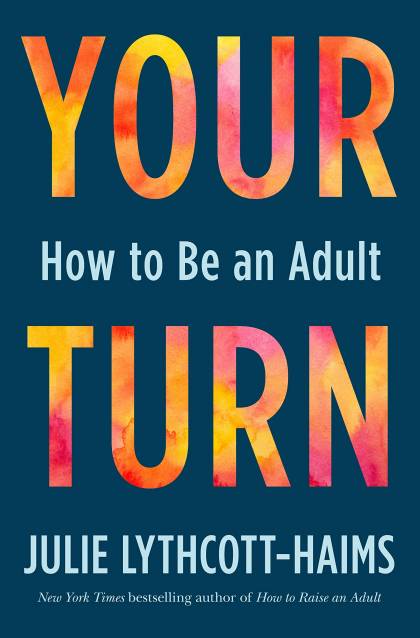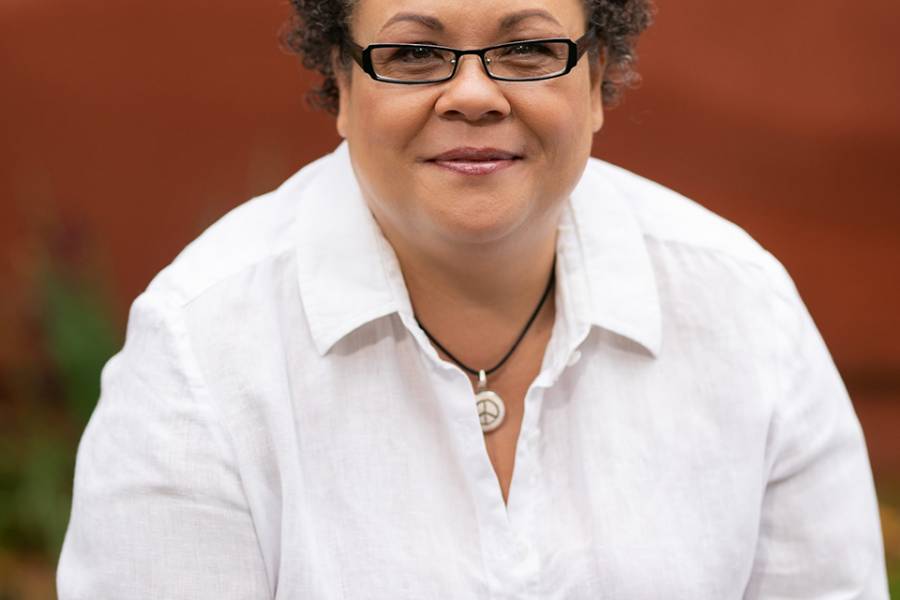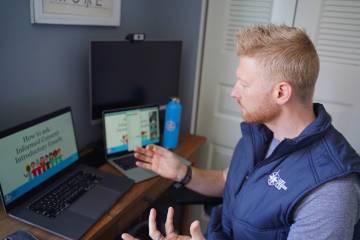A month ago, Johns Hopkins seniors claimed their degrees and entered the world as college graduates ready to tackle the challenges ahead. But for many, the post-college world can be difficult to navigate.
As a former dean at Stanford University, Julie Lythcott-Haims has seen firsthand the challenges of transitioning from a college setting into the professional world. Students wonder, Do I find a job that pays well or supports my passions? Should I stay close to home or find somewhere new to live? How do I carve out the right life for me?
Now an activist and self-help writer, Lythcott-Haims focuses her career on helping people with the skill of "adulting," the stage of life where individuals become independent and responsible for their own actions and survival. Her latest book, Your Turn: How to Be An Adult, covers that vital period and discusses the challenges young people face when trying to establish their careers and their lives.
On Thursday, July 1 at 12 p.m., Lythcott-Haims will join Farouk Dey, vice president of learning and life design at Johns Hopkins, for "Adulting Reimagined," a free-ranging conversation about what the current generation can expect in their transition into young adulthood.
The conversation is part of Johns Hopkins' Vision Chats series, where experts across disciplines are invited to have unscripted conversations about the future of education, work, technology, industry, health, environment, and society.
"We launched Vision Chats to offer insights into the future during a time of global change in every facet of our lives," Dey said. "I couldn't have imagined a better closer of season 3 of Vision Chats than Julie Lythcott-Haims and a genuine conversation about how post-graduation adulting will change in the future as we send our new batch of graduates into the world."
The Hub caught up with Lythcott-Haims to discuss the upcoming event, her book, and Gen Z's place in the world.
Could you talk about how you define the word "adulting"?
About 10 years ago, Millennials began saying "I don't want to adult; I don't know how to adult. Adulting is scary." And it was a plaintive cry from a generation that began to shift the conversation. We began to realize "Oh, we take for granted that we become adults and that's fine." We coined a stage of life that maybe warrants greater attention, more explanation, and more guidance.
I consider adulting as simply a stage of life between childhood and death, a sweet set of decades where you're more or less in charge of yourself. Adulting is that intrinsic knowledge that this is on me to figure out, to deal with. It's fundamentally about having agency and a sense of "I can" and resilience.
You mentioned that this was an idea developed by the millennial generation. Now that we're seeing Gen Z start to make this transition themselves, do you think they have a different relationship to the concept of adulting?
Gen Z are just now dipping their toes into adulthood, so I think it's an open question as to whether they regard it as a seamless transition or as an enormous chasm to leap. But I will say that millennials have normalized the notion that adulting is hard, and Gen Z has emerged into the world with their generational forefathers and foremothers having articulated that. So in some ways, it's the new normal. It's not as relevant that it was seemingly easier for Gen X and Boomers because things have changed, and that's the zeitgeist into which Gen Z is emerging.

Could you talk a little about your book Your Turn: How to Be an Adult and how it relates to the upcoming Vision Chat?
The first thing I'm going to say is there is no right track. There is no track for that matter. You may have been raised by people and through educational systems that laid out a track for you to follow, and you were good at following that track, but adulting has no track. That can be jarring, but hopefully the realization also comes with relief.
Your task is to figure out, in terms of work, what are you good at and what do you love? Your work should be a combination of those two things. Don't just follow the perceived right track because you have to be good at that and everyone's telling you to go into engineering. If you don't love the work, don't do it. You're here to figure out who you are, what you're good at and what you love. And that intersection is necessary for the work to feel meaningful.
The second thing is that you're not perfect. That has been a hallmark of how Millennials and Gen Z have been raised, the constant chirp of perfection from parents and teachers and well-meaning others has led to a generation looking for evidence of their own perfection and feeling inadequate. There is no such thing as actual perfection and the pursuit of it will drive you mad. Life is all about learning and growing. You take a learner's mindset; that's the way to build strength and resilience.
What drew you to want to write about this stage of life?
So my first book is on a type of parenting that is harming kids and young adults. I was a dean of freshmen and undergraduate advising at Stanford, and over 14 years, I had developed a perspective on how childhood had changed, resulting in too many college students being handheld by parents who wanted to do the regular stuff of life for their students. I intuited that was going to be problematic psychologically for those students, and it was going to result in a lack of readiness for the workplace. That led to my first book, How to Raise an Adult.
This book is a companion in that it's for any young adult, regardless of how they were parented. It's me rooting for young adults to make it unencumbered by their own insecurities and by other people's judgement. This is me rooting for the individual young person to make it.
For a lot of young adults, so much feels out of their hands: the pandemic, economic crises, the housing market, and so on. What are some ways that millennials and Gen Z can take charge of their own future or at least feel like they have some autonomy?
In the pages of my book, I speak to these stark macro societal differences. I speak to the fact that a lot of older folks may not understand why you don't go out and get a job or why you're still living at home. So step one is simply validating that.
But if things have changed, what can you do? Well, you can make great choices about where to live and where to work. It's not that every place is unaffordable, it's that many big cities are unaffordable, but you don't have to live there. If you Google great places for young adults or college graduates, you'll find surveys of cities and towns that have jobs and nightlife and a decent cost of living. Those places exist around the country.
Do you have any concerns about the younger generation?
Gen Z inspires the heck out of me. From their insistence that gun violence is rampant and should not be tolerated, to their insistence on looking for solutions to the climate crisis, to the way that they value everybody at the level of the individual, they seem to be grasping their own right to lead a life within a context of a set of systems that are very screwed up and, in many places, broken. So I'm very optimistic when I look at them.
Registration for "Adulting Reimagined" is available here
Posted in Student Life









